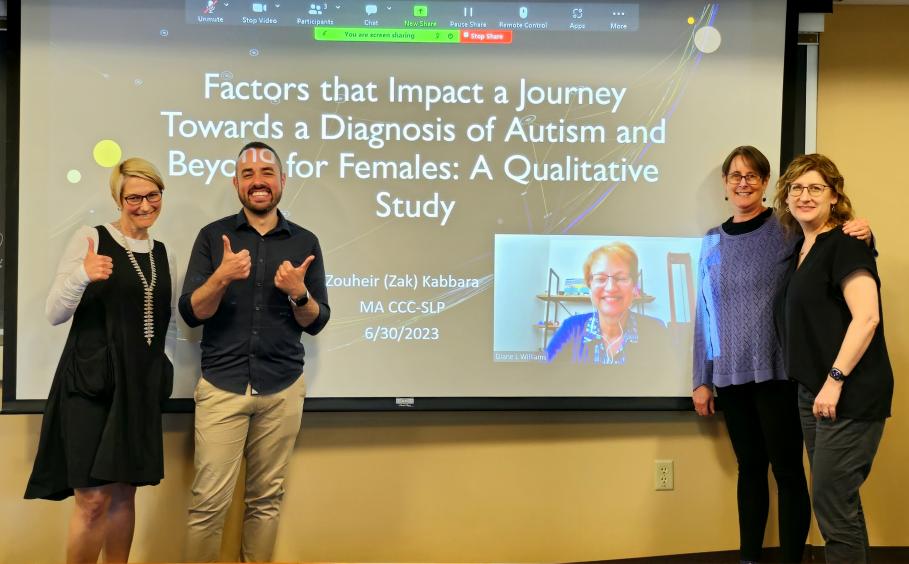-
About
Explore
-
Undergraduate
Explore
-
Graduate
ExploreUp a level (this gets replaced in JS)
-
Getting Started
Explore
-
Diversity, Equity, and Inclusion
Explore
-
Student Support
Explore
-
Get Involved
Explore
-
Get Connected
Explore
-
Gain Experience
Explore
-
Commencement
Explore
- Events
- Visit and Apply
- Contact Us
-
Getting Started
-
Research
Explore
-
Alumni
ExploreUp a level (this gets replaced in JS)
- HHD On Location - Home Edition
-
Getting Started
Explore
-
Alumni Support
Explore
-
Parents and Families
Explore
-
Get Involved
Explore
-
Get Connected
Explore
-
Donate
Explore
- Alumni News
- Alumni Events
- Give to CSD
- Update Your Contact Information
-
Outreach & Service
ExploreUp a level (this gets replaced in JS)
-
Speech, Language, and Hearing Clinic
Explore
-
Supporting Communication Through Performance
Explore
- Events
- Support
- Contact Us
-
Speech, Language, and Hearing Clinic
-
Contact
ExploreUp a level (this gets replaced in JS)
-
CSD Contacts
Explore
-
Speech, Language, and Hearing Clinic
Explore
-
College Contacts
Explore
- Department Directory
- Speech, Language, and Hearing Clinic
-
CSD Contacts
-
Departments
Explore
-
Research Centers
Explore
-
Central Administration
Explore
-
Training and Support
Explore
- Contacts/Directory
Degree Requirements

The Ph.D. program provides the opportunity for students to develop expertise as researchers in the field of communication sciences and disorders. The program will prepare doctoral students to fulfill faculty positions or research positions at universities or research institutes, and to assume leadership roles within the field of communication sciences and disorders.
Program expectations
Upon completion of the program, all Ph.D. students are expected to graduate with:
-
A broad understanding of the field of communication sciences and disorders
-
Extensive expertise in a scholarly area of specialization
-
Significant expertise in at least two related areas of study within the field of communication sciences and disorders
-
Significant expertise in a related area of study outside the Department of Communication Sciences and Disorders
-
Significant competence in research methods for knowledge generation and dissemination
During the program
Ph.D. students will be provided with:
-
Academic coursework in communication sciences and disorders and related content areas
-
Research training and experiences
-
Access to nationally- and internationally-recognized faculty
-
Training in state-of-the-art research methods and technology
-
Experiences in reading, critically reviewing, and synthesizing the research literature in communication sciences and disorders, as well as in areas of related and general interest
-
Experiences in scholarly writing
-
Opportunities to develop high quality academic and clinical teaching skills
What to expect
The doctoral program consists of far more than simply taking academic courses and meeting the formal requirements for the degree. Rather, pursuing a doctoral degree provides the opportunity for students to participate in a wide range of faculty research, colloquia, informal seminars, discussion groups, conferences, etc. Pursuing a doctoral degree sets the stage for lifelong learning and scholarship.
Each doctoral student has the opportunity to develop an individualized program of study approved by the student's doctoral committee. Typically, this program of study involves:
-
An area of specialization within the Department of Communication Sciences and Disorders (the major content area)
-
At least two related areas of study in the field of communication sciences and disorders
-
At least one related area of study outside the Department of Communication Sciences and Disorders
-
Methodology and statistics requirements
-
Language/communication requirements
Graduates of the program will be prepared to assume careers as researchers and scholars at colleges, universities, and research institutes. The Ph.D. program is not an advanced clinical degree; it is conferred in recognition of the attainment of the highest academic excellence and productive scholarship.
All students will complete, at a minimum, three projects: a first (Qualifying Exam), second (Comprehensive Exam), and third (Dissertation) doctoral project.
Detailed information on program requirements is available in the Ph.D. Student Handbook and the Graduate Bulletin.
Ph.D. Program
Department of Communication Sciences and Disorders
The Pennsylvania State University
308 Ford Building
498 Allen Road
University Park, PA 16802
gradCSD@psu.edu
814-865-0971
